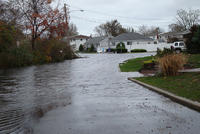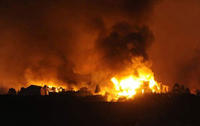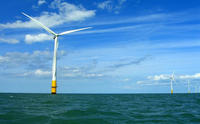-
To keep global average temperature from rising above 2°C, action should be taken by 2020
Limiting climate change to target levels will become much more difficult to achieve, and more expensive, if action is not taken soon, according to a new analysis; a new study explores technological, policy, and social changes that would need to take place in the near term in order to keep global average temperature from rising above 2°C, a target supported by more than 190 countries as a global limit to avoid dangerous climate change
-
-
New view of meteorite impact
High-speed video of projectiles slamming into a bed of disks has given scientists a new microscopic picture of the way a meteorite or missile transfers the energy of its impact to sand and dirt grains; the research may change the way scientists model meteorite and missile impacts and their effects
-
-
Climate change, water shortage play only secondary role in causing conflict – at least so far
Intelligence services and militaries around the world have been talking about, and preparing for, the danger of “water wars” and about climate change as a threat to national security; the results of an EU-funded research project, however, found that such discourses oversimplify a complex reality; climate and water resource changes are important, but play only a secondary role — at least for the time being — in the causation of conflict and insecurity compared to political, economic, and social factors
-
-
Sandy exposes weaknesses of antiquated sewage systems in N.Y., N.J.

Hurricane Sandy destroyed homes, apartments, and entire communities, and it also exposed the outdated sewage systems in New York and New Jersey; since Hurricane Sandy, millions of gallons of raw sewage have infiltrated waterways in both states, and it could take several years and billions of dollars to fix the systems; New York governor Andrew Cuomo estimated that it will cost about $1.1 billion to repair treatment plants; officials in the field say that much more will have to be done
-
-
Cybersecurity company using hackers own devices against them
A California cybersecurity start-up, marketing itself as a private cyber intelligence agency, works to identify foreign attackers who are attempting to steal corporate secrets; it does so by using the attackers’ own techniques and vulnerabilities against them; the company also collects data on hackers and tricks intruders into stealing false information
-
-
Expert show how to crack every common password in under six hours
GPU computing has improved considerably in recent years, and Jeremi Gosney, founder and CEO of Stricture Consulting Group, used a 25-GPU cluster that can run through 350 billion guesses per second to show how easy it would be to crack practically any password out there (easy, that is, if you can use a 25-GPU cluster )
-
-
Engineers to build Australia’s first bushfire resistant straw house
With Australia’s bushfire season fast approaching, construction of the first bushfire resistant straw bale house tested by engineers from CSIRO has begun in rural Victoria; the house is based on design principles that minimize environmental impact and it is set to withstand temperatures equal to that of a worst case bushfire scenario
-
-
Helping communities resist wildfires

In the ten years since 2002, an annual average of nearly 71,000 wildfires near structures and other human development were recorded and 1.9 million hectares (4.7 million acres) burned; federal agencies spend an average of $1.2 billion per year on the suppression of these fires, with state and local agencies contributing millions more
-
-
Target of limiting global warming to 2°C recedes as CO2 emissions grow
A new report shows that global CO2 emissions have increased by 58 percent since 1990, rising 3 percent in 2011, and 2.6 percent in 2012; the most recent figure is estimated from a 3.3 percent growth in global gross domestic product and a 0.7 percent improvement in the carbon intensity of the economy; these latest carbon dioxide emission figures continue to track at the high end of a range of emission scenarios, expanding the gap between current trends and the course of mitigation needed to keep global warming below 2°C
-
-
City officials debate proposals for sea walls to protect New York from storms
Since Hurricane Sandy ripped through the northeast, many people have had to decide what to do with their damaged homes; now elected officials in New York must decide how to protect coastal areas around the city from being run over by storms in the future; New York officials are now proposing similar projects, including a $16 billion barrier for New York Bay, which was proposed by City Council president Christie Quinn
-
-
Improved research tools helped predict impact of last week’s Japan earthquake
On 11 March 2011, a magnitude-9.0 earthquake and ensuing tsunami that slammed into northeastern Japan killed or left missing some 19,000 people, devastating much of the coast; lessons were learned, and improved computational models helped in more accurately predicting the impact of a strong earthquake near Japan last Friday
-
-
Testing new wind energy turbine

An offshore wind test turbine has been erected behind the University of Maine Advanced Structures and Composites Center on campus to evaluate sensor systems and controls in preparation for the installation of a floating turbine in the Gulf of Maine this spring as part of the DeepCwind Consortium project
-
-
U.S. intelligence forecast: growing interstate conflicts over food, water

The U.S. National Intelligence Council, the research arm of the Office of the Director of National Intelligence, yesterday released its Global Trends 2030; the report’s authors say that food, water, and energy will be more scarce; “Nearly half of the world’s population will live in areas experiencing severe water stress,” the report notes; Africa and the Middle East will be most at risk of food and water shortages, with China and India also vulnerable; one bright spot for the United States: energy independence sometime between 2020 and 2030
-
-
Wind and solar power, paired with storage, would be cost-effective way to power grid
Renewable energy could fully power a large electric grid 99.9 percent of the time by 2030 at costs comparable to today’s electricity expenses, new research says; a well-designed combination of wind power, solar power, and storage in batteries and fuel cells would nearly always exceed electricity demands while keeping costs low, the study authors found
-
-
Climate models still struggle with medium- term climate forecasts
Scientists have evaluated twenty-three climate models and concluded that there is still a long way to go before reliable regional predictions can be made on seasonal to decadal time scales; none of the models evaluated is able today to forecast the weather-determining patterns of high and low pressure areas such that the probability of a cold winter or a dry summer can be reliably predicted
-
- All
- Regional
- Water
- Biometrics
- Borders/Immig
- Business
- Cybersecurity
- Detection
- Disasters
- Government
- Infrastructure
- International
- Public health
- Public Safety
- Communication interoperabillity
- Emergency services
- Emergency medical services
- Fire
- First response
- IEDs
- Law Enforcement
- Law Enforcement Technology
- Military technology
- Nonlethal weapons
- Nuclear weapons
- Personal protection equipment
- Police
- Notification /alert systems
- Situational awareness
- Weapons systems
- Sci-Tech
- Sector Reports
- Surveillance
- Transportation
Advertising & Marketing: advertise@newswirepubs.com
Editorial: editor@newswirepubs.com
General: info@newswirepubs.com
2010-2011 © News Wire Publications, LLC News Wire Publications, LLC
220 Old Country Road | Suite 200 | Mineola | New York | 11501
Permissions and Policies
Editorial: editor@newswirepubs.com
General: info@newswirepubs.com
2010-2011 © News Wire Publications, LLC News Wire Publications, LLC
220 Old Country Road | Suite 200 | Mineola | New York | 11501
Permissions and Policies
